There are gender wars, and then there are casualties. It wasn’t until 2011 that the behemoth toymaker LEGO acknowledged girls’ desire to build with bricks, even though the company had long before made a seemingly effortless pivot to co-branding, video games, and major motion pictures. So it’s little wonder that girls face all-too-real obstacles when […]
Read moreBridging the information gap one step at a time.
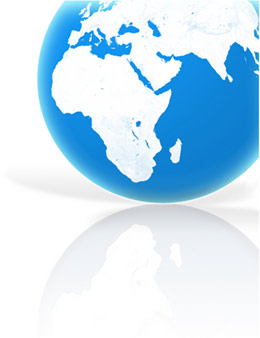 |
Problem
Increasing access to information for hard-to-reach populations is critical to enabling them to overcome obstacles to education and development.
Solution
Although the distribution and implementation of information technology is a complex effort happening on many fronts, there are many success stories from which individuals and organizations seeking to increase access can take their cue.
Discussion
Forge forward, even without “best practices”
No set of universally acknowledged “best practices” for using information technology exists yet. Like the Internet itself, the effort to open up access to technology is certainly unregulated and largely uncoordinated. The effort itself is relatively young. Formulas for introducing hardware, infrastructure, training, and applications become problematic in the face of dramatic differences in environment and culture in areas too remote to have them already. Poverty there can keep commercial interests from seeing such areas as “markets,” an important motivation for obtaining corporate support. Governments of jurisdictions where access is an issue often see technology as a luxury for their affluent citizens, and not as a necessary tool for national development. Governments in affluent nations are unlikely to help without being able to see a political “up side.”
|
Cahuita students are taught in a technology-based curriculum, while their parents receive training at the Cahuita Computer Center, the product of a successful collaboration among the Costa Rican government, corporate seed resources, and community stakeholders. |
As a result, projects to promote access must understand in cultural terms what innovation will mean; use political skills to interest governments in supporting infrastructure and creating positive regulatory environments; and offer corporations incentives on their own terms to join the effort. When success stories emerge, they can provide solid direction toward what works, and advice on avoiding what doesn’t, in these areas and others.
Create conditions for self-sufficiency
Partnerships that have significant roles for private, public, and community stakeholders are especially fruitful when they are aimed toward enabling those with the most to gain to assume responsibility for them.
Opportunity Access, a nonprofit founded by a former Bell Atlantic engineer, uses recycled equipment to provide training to the adults of Cahuita, Costa Rica, as well as a school curriculum that incorporates technology into learning for the community’s children. Adults in the community are trained and employed in all aspects of managing a computer center, including equipment refurbishing and technical support skills, as well as Microsoft certification. When OA was founded, Cahuita had no computers in its schools and no public high school, resulting in a dismal high school graduation rate of around 15%. To date, OA has provided 1,375 services for 34 schools, serving 7,250 children. 200 computers have been refurbished and installed into fifteen computer labs in the public school system. A curriculum has been developed for the primary and secondary school levels, and 1,250 graduate certificates have been awarded to participants in the adult education certificate courses. Community response has been overwhelmingly positive, and the project has the support of the Costa Rican Ministry of Public Education and Intel’s Education for the Future project.
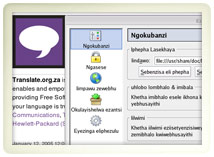 Translate.org.za provides translation software to enable South Africans to use Mozilla browsers in their native languages. |
Anticipate and eliminate language barriers
Even those who have an expanded understanding of “access” can miss the most obvious barriers. Eliminating language barriers is critical to enabling new users of technology to focus on that learning curve; it is steep enough, without having to understand information delivered in a foreign language. The same sensitivities should apply to all aspects of national and cultural identity.
Translate.org.za is a non-profit organization producing free and open source software to provide to South Africans. The Translate Project started in 2001, with the vision of providing free software translated into the 11 official languages of South Africa. Sponsored by the South African Department of Communications, The Shuttleworth Foundation, Obsidian Systems, St James Software and Hewlett-Packard (South Africa), the project launched its OpenOffice.org 2.0 software in all of the official languages in November, 2005. At the launch celebration, a spokesman for the translators said, “When you speak my language, you speak to my heart. When you speak to me in English, you speak to my head, you speak business.” Translators at the University of South Africa have been involved in the translation of OpenOffice.org into South African languages. The organization has also designed a keyboard, spellcheckers, and a “Google in your language” program for all of the official languages.
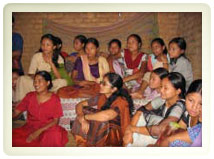  Above, a facilitated listening group in Nepal tunes into “Let’s Talk Straight,” a radio drama about life in a village like their own. After the broadcasts, listeners discuss solutions to the difficult situations dramatized in the program. Millions of Nepalese in remote regions tune in every day to satellite and local FM stations broadcasting the programs. Below, a young Dalite girl, Nirmala, is setting up the satellite antenna. In the village of Churuamai, she is the caretaker of the receiver and all the discussion groups in her village meet in her home. |
Keep the “fun” in “fundamentals”
Sophisticated users of information technology may have forgotten the role that stories, games, chat rooms, and instant messages played in first acclimating them to the online world, but they should recall it when planning to help new users enter the world of technology-assisted learning. Entertainment channels are an important vehicle not only for educating, but for maintaining momentum in climbing the learning curve required to establish technology as part of daily life.
Reaching rural Nepalese is a challenge. Equal Access, an international nonprofit, uses targeted content, cost-effective technology and community engagement to reach people in remote regions. The organization’s core competency is “based on listening to the specific needs of the communities that we serve. Only through this listening process can we foster the creation and distribution of targeted, culturally appropriate information.”
Much like American soap operas and mini-series, the radio dramas have devoted followers in villages where Equal Access has located receivers. The stories are aimed toward empowering rural women and preventing the spread of HIV/AIDS, while providing critical information on sustainable livelihoods, human rights, early childhood development and safe migration. After only a year of broadcasting, the organization documented increased knowledge, shifting attitudes and behavior changes in participating communities.
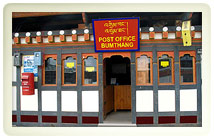 The e-post facility allows messages sent to the post office to be delivered as local post. Thirty eight post offices will be covered, five of which are located in the northern and north-eastern areas of Bhutan, at altitudes between 3,500 to 5,300 meters above sea level. So far, these villages have been served by “postal runners”, a one-way trip taking anywhere between three to seven days on foot. |
We don’t miss what we don’t have
One of the startling aspects of the “good enough” solution is that it often constitutes a far more dramatic change than we realize. If we fixate on the “best possible” outcome, we may forget to take advantage of the momentum and enthusiasm generated by a great improvement. The value of innovation often lies not in how far we come, but in the impossibility afterward of going back.
The International Telecommunications Union, a U.N. organization headquartered in Geneva, initiated a project in Bhutan for the provision of e-post and other developmental services in post offices. The Government of India participates in the project, which involves the transfer of expertise, know-how and technology from a developing country to a least developed country. Encore Software will provide Simputers and applications focused on e-post, health, agriculture and education. WorldSpace handles the delivery of content as well data-casting facilities integrated to Simputers. Technologies such as hand-held multimedia devices and software that enables translation into local languages are integrated in order to overcome barriers of illiteracy, computer literacy, language and costs. It is expected that, in addition to e-post, the Post Offices will become resources for the local schools as well as for health, agricultural and veterinary workers.


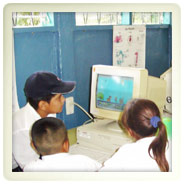
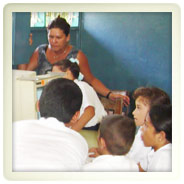
03 Oct 2012, 9:57 pm
Yes, the same problems confound the information age of the last decade. Despite the information explosion, third world countries and learning institutions were left behind. But with initiatives ranging from affordable internet and hardware grants, we can assimilate the information sharing model of the internet into learning institutions. it services bristol will help on that.